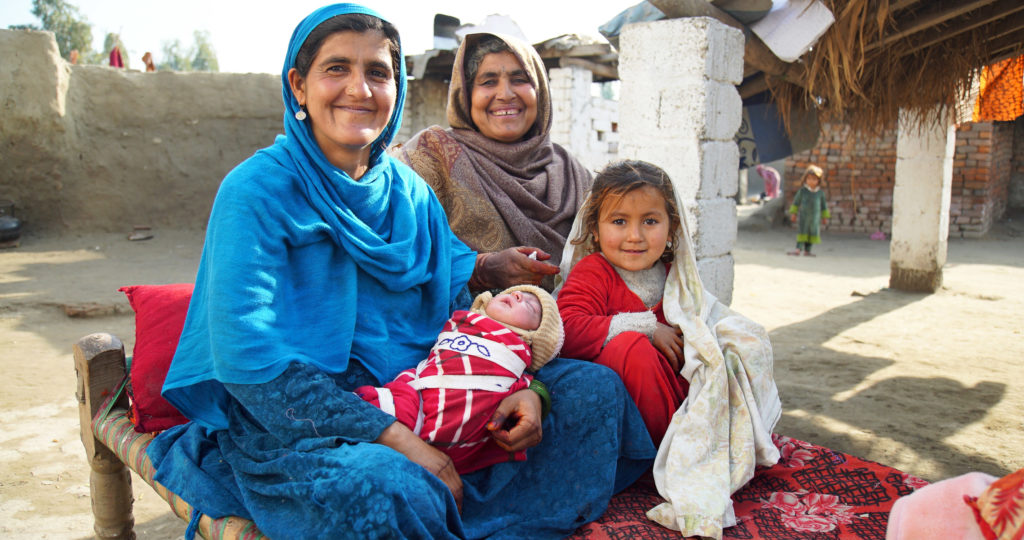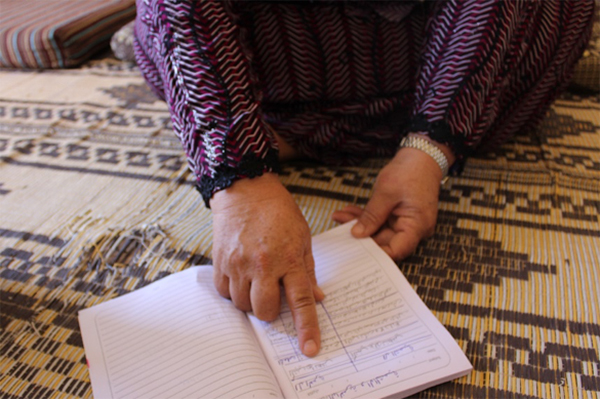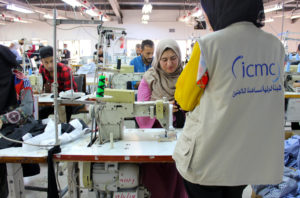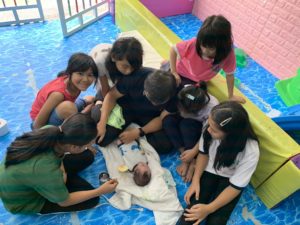Humanitarian Assistance & Development
ICMC provided supplies and services to meet the fundamental needs of forcibly displaced persons, including health care, food and household items and financial and livelihood support. By doing so, it helped refugees and migrants reclaim a life in dignity and regain their independence and self-sufficiency.
Highlights
Over 38,000 refugees in 11 camps in Pakistan received general medical and specialized maternal health services at ICMC-run facilities.
Nearly 3,000 people in Pakistan participated in ICMC community sessions on hygiene promotion and disease prevention.
Some 1,350 Afghan refugees learned about inclusion of people with disabilities in health services, while 100 health care staff received specialized training from ICMC Pakistan.
ICMC Jordan supported nearly 2,200 households with cash assistance to pay rent, prepare their accommodation for winter and meet urgent needs.
ICMC Pakistan facilitated 50 scholarships for refugee children and conducted remedial courses to enable 44 children to enroll in school for the 2020 term.
ICMC support enabled 22,000 refugee children in Pakistan’s Khyber Pakhtunkhwa District to attend school.
In Pakistan ICMC supplied 15,000 children with textbooks or school bags, while more than 5,500 boys and girls in Jordan received ICMC educational supplies.
ICMC Jordan distributed 700 hygiene packages for infants and toddlers, 4,100 personal hygiene kits and 350 incontinence kits.
ICMC Pakistan conducted 400 individual counselling sessions on issues related to livelihood opportunities and supported 18 refugees in the job search process.
ICMC provided Arabic and English literacy courses to a total of 500 women and men.
ICMC Jordan’s vocational training program graduated 200 students and two pilot training courses offered people with disabilities an opportunity to gain skills.

A Safe Birth at Home
Excited and nervous. This is how Palwashay, a 28-year-old Afghan woman living in Khazana refugee camp in Pakistan, felt when she learned she was expecting her third child.
She thought of her experience of her first two births, when she was at home without any formal medical assistance and nearly died. “I suffered so much,” she says.
But this time Palwashay was able to get the support of Sultan Bibi, a Traditional Birth Attendant who works with ICMC to provide ante- and postnatal care for Khazana residents.
For Palwashay and her husband Alamzeb, Bibi’s care and advice – about everything from proper maternal nutrition, infant feeding and breast care to personal and home hygiene – eased their fears.
Bibi was by Palwashay’s side throughout the safe delivery of her daughter and follow-up care, creating very different memories of this third birth. “I consider myself very lucky for having got proper care and medical assistance in my own house.”
Laying a Foundation of Good Health
People who have had to flee their homes because of war, violence or persecution face serious challenges to stay in good health, especially if they have found refuge in a country with a healthcare system under strain. In 2019 ICMC provided medical assistance to refugees and worked with communities and governments to improve the quality of care.
In Pakistan ICMC established a new partnership with the NGO Humanity and Inclusion to provide integrated and inclusive health assistance to Afghan refugees. Over 38,000 patients received primary health care services at ICMC-run facilities in 11 refugee camps. This included both general medical examinations and specialized ante- and postnatal care.
Nearly 3,000 people participated in hygiene promotion and disease prevention awareness sessions that ICMC held in the community.
ICMC also ran community sessions for more than 1,300 Afghan refugees about the inclusion of people with disabilities in health services. Some 100 staff of basic health care facilities run by ICMC and the Pakistani government received training to ensure that services do not exclude people with disabilities.
ICMC’s medical department provided care to over 150 Afghan and non-Afghan refugees, including 25 chronically ill patients. The more than 800 interventions took the form of daily hospital visits, consultations and check-ups for referred and walk-in patients, medication dispensing, lab tests and help with breast feeding.
Attending to Basic Needs
Forcibly displaced people often have to leave almost everything behind and may not be able to acquire the necessities of life where they have found refuge. In 2019 ICMC continued to provide refugees with material and financial aid to meet their basic needs and enable them to live in dignity.
In Jordan ICMC assisted highly vulnerable refugees with an expanded cash assistance program. Such support allowed families to decide for themselves which purchases were most important for them. Cash assistance enabled more than 1,100 households to make their accommodation safe and comfortable during the colder winter months. A one-time distribution of cash was made to over 530 vulnerable households facing urgent needs. Moreover, 500 families received funds to rent housing, which ensured that they were able to afford a safe living space.
ICMC Pakistan provided support in the form of subsistence allowances to 15 highly vulnerable refugee families referred for assistance by the UN Refugee Agency, UNHCR . An equal number of families received funds to purchase groceries. One-time financial assistance and a housing rental allowance were each distributed to another refugee family in particular need.

The Value of an Education
Sitting in a classroom for the very first time has opened a door onto life for mother-of-three Duha. Growing up an eldest child in Syria, Duha was expected to help bring up her younger siblings, not attend school. Not being able to read or write has weighed heavily on her. “I felt blind to the world around me.” She wasn’t able to read public transit signs and rarely left her house. War forced Duha and her family to seek refuge in Jordan in 2013. Five years later she found ICMC’s Arabic literacy classes, which have been a boon to her confidence and self-esteem.
ICMC’s educational and recreational support helped children to access their basic right to education. ICMC Jordan distributed more than 5,500 kits with educational supplies and other learning materials to girls and boys. In Pakistan some 9,900 primary school-aged refugee children received textbooks from a new national syllabus and over 6,000 received school bags.
ICMC Pakistan secured support from the Ali Trust for scholarships for 50 refugee children in primary and secondary education. With ICMC’s help, over 50 children were able to take an admission test for the Ali Trust School. ICMC launched remedial classes for the children who did not qualify for admission to enable them to enroll in the new term in 2020.
Under the auspices of ICMC’s sponsorship program, ten refugee children were enrolled at no cost at the Estiqlal Lycee High School, an educational institution serving the displaced Afghan population in Pakistan.
In partnership with UNHCR, ICMC provided support to nearly 22,000 refugee children in Pakistan’s Khyber Pakhtunkhwa District, a third of them girls, to attend school and access a quality education.
In Jordan ICMC distributed more than 5,100 hygiene kits to meet essential needs, including packages for infants and toddlers, personal hygiene items and incontinence pads.
Ensuring the Means to Earn a Living
For many refugees, being forcibly displaced means losing one’s ability to be self-sufficient. In 2019 ICMC’s livelihoods projects provided a path back to employment and opportunities to become more independent.
In Pakistan, ICMC facilitated enrollment in courses offered by certified training institutes for 25 refugees, Afghan and other nationalities, after successful assessment. Of these, 15 attended language classes and the remainder a skills development course.

No Longer Just Dreaming of a Job
Finding a job used to be just a dream for 18-year-old Suhir, who lives with disabilities. Breaking into the labor market in Jordan is an uphill struggle for women like her, and barely 5 percent of refugees with disabilities are employed. But Suhir is now working in a sewing factory thanks to skills she learned through ICMC Jordan’s vocational training for Syrian refugees and Jordanian students with disabilities. The young woman, one of the program’s first graduates, has found employment via a job matching scheme of ICMC and a partner organization and has made at least one of her dreams come true.
ICMC Pakistan’s Livelihood Officer conducted over 400 individual counseling sessions advising refugees on income-generation opportunities, including job placement advice. Eighteen refugees, an equal number of each gender, received assistance in applying for jobs, making the shortlist and securing a job interview. ICMC also advised regarding creation of product displays and ordering logistics, which was useful for refugees wanting to sell handicraft items to become self-sufficient.
Two hundred students graduated from ICMC Jordan’s vocational training program, choosing from instruction in dessert creation, beauty care, plumbing or tailoring. Over 55 percent of the graduates also completed ICMC’s courses to develop employability skills. ICMC Jordan also piloted two vocational training courses in tailoring for individuals with hearing and speech impairments.
ICMC supported each graduate to start their own business, when possible, or provided job matching services with employers in their trade. By the end of the program, 155 out of 200 participants reported that they were employed.
ICMC continued to be the only humanitarian organization offering adult literacy classes in Jordan. In 2019 over 500 women furthered their education by taking part in ICMC’s Arabic and English literacy courses. The classes provided welcome social contact for the women, while also having the ripple effect of increasing their self-confidence and sparking community initiatives.
Member's story
Hope and Dignity for People Living With HIV

Vietnam, like other countries in Southeast Asia, is seeing an increase in human trafficking. Many women living with HIV are also internal migrants, having moved from rural to urban centers. Women usually migrate in response to an offer of employment or relationship, increasingly on social media.
As a result, they often find themselves trapped in situations of exploitation, prostitution, coercive employment, sexual abuse or a forced marriage, either abroad or in an unfamiliar area of their home country. Survival prostitution may seem the only option for those who are able to escape. Often lacking legal documentation and the means to return home, they cannot seek protection under the law or get health care. Their risk of contracting HIV increases.
In the face of decreasing international support to developing countries, the Church has stepped into the breach to provide care and a path to renewed dignity for those affected by HIV, including internal migrants and survivors of human trafficking or other forms of sexual exploitation.
The Mai Tam House of Hope in Ho Chi Minh City is one example. The shelter is a place of refuge for HIV-positive women and orphaned children, where they can find a place to stay, food and antiretroviral and other medical treatment. Older residents care for the children living there and all can receive psychosocial support and take part in educational or livelihood programs.
And they find spiritual care as well through the Church. The Ho Chi Minh City Archdiocese runs a program providing pastoral support to people living with HIV. Religious and lay men and women connect with HIV-positive people, including those in prison or at drug detention centers, offering counseling and spiritual accompaniment.
This is an important part of providing for survivors of HIV, according to Fr. John Toai, program director of the Archdiocese’s pastoral care program and director of the Mai Tam House of Hope. He says experience has shown that reconciliation with the past and dealing with anger and resentment are necessary steps for survivors of HIV to find a path to a new life. “If we as a Church accompany them and empower them and help them get through this crisis, they will recover their dignity and feel confident again.”
The Church is building inclusion along that path through awareness raising about HIV. “In our Church there is [now] a lot of compassion and empathy for people with HIV. People infected feel welcomed and accepted,” says Fr. Toai.

